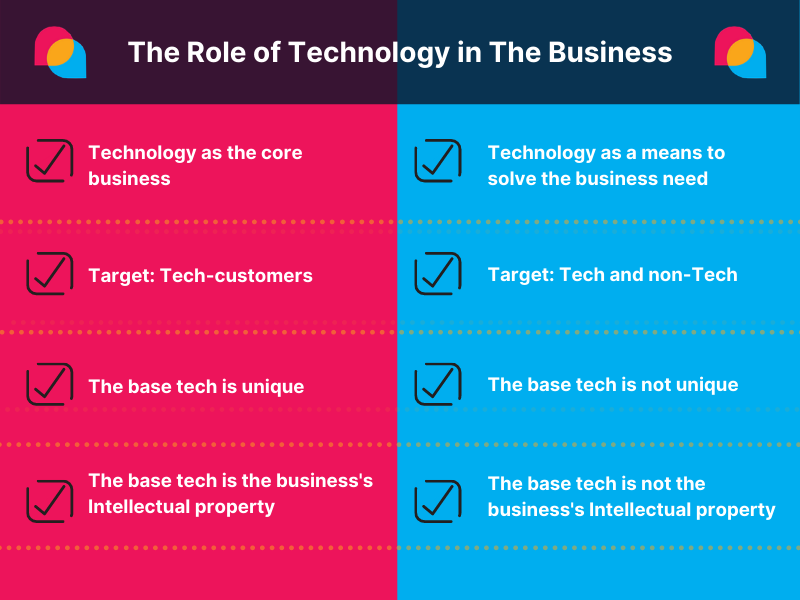In 2011, Marc Lowell Andreessen famously said in his essay Software is eating the world: “... You’ll understand why the software talent shortage is approaching a crisis. With such a global appetite for software, demand for developers far outstrips supply, especially as more companies stake their futures on digital transformation.” Nine years later, his projection stands true.
Outsourcing software development has become so common that there is no need to ask, “Should we outsource?”. The better question would be “How to do it the right way?” and it is even more vital to SMEs and startup owners. To help them make the right decision, we’d like to explore some common advantages and disadvantages of offshore software development.
The Outsourcing Decision Checklist
First of all, SME and startup owners should determine which role technology plays in their business by looking at the following checklist:

If all the red boxes are correct to the business, SME and startup owners should not outsource. If the technology is unique and intellectual property to the core business, outsourcing only makes it prone to piracy and threatens the business’s survival. On the other hand, SMEs and startups can consider outsourcing when all blue boxes are checked.
Advantages of Offshore Software Development
Reduce cost
It is inarguably the first reason to outsource. SMEs and startups with limited finance capital tend to find alternatives that help them tighten their spending. Meanwhile, operating expenses for office rental, stationery, and equipment for a full-fledged software development team are costly. Here’s one interesting fact: 90% of software developers in the United States have an hourly rate of nearly 80 US dollars, while that of developers in Southeast Asia is around 30 dollars. Therefore, looking to work with an offshore software development team may well be a profitable choice.

Access round-the-clock working time
Some may see the time zone difference as an obstacle. Actually, it can become a competitive edge when looking from a different perspective. For example, the time zone gap between a country in Southeast Asia is 12 to 16 hours ahead of the United States. When a startup based in the States works with an offshore partner in Southeast Asia, he/she can “buy” up to 16 hours of work in the future! That opens up a great opportunity to complete tasks ahead of time, helping to speed up the project.
Optimize human resource
Building a team is a tough nut to crack!
First and foremost, the recruitment process is time-consuming and pricey. SME and startup owners will either need their in-house recruiters or headhunting agencies to do the recruiting. Once they secure the right people, it will then take time for new staff to settle in, get through a “warm-up” period, catch up with work, and get further technical training. On the other hand, outsourcing offers:
Leverage talent beyond borders.
The number of software developers in 2019 was 23,9 million worldwide and is estimated to increase to 28,7 million by 2024. Thus, SMEs and startups can dive deep into a much fuller talent pool and find great IT minds. It is also projected that the Asia Pacific and Latin America will see slightly higher growth than North America or the EMEA region.
Find the right expertise at your disposal.
Expertise does not come overnight. It is a blood and sweat process for a junior software engineer to become a senior and then a specialist. The amount of technical knowledge that comes from education, hands-on experiences, and constant learning takes time to make an expert. That’s when outsourcing comes in handy. The offshore team has specialized developers who focus on a few areas and master their technical how-knows. Partnering with a foreign team helps SME and startup owners extract the intelligence and supplement their core team’s competency.
There is also a cost-efficient factor here. The offshore team bears the expense of their own team members’ technical knowledge training and helps SME and startup owners save a considerable amount of money.
Increase scalability
The product development process can get quite hectic en route. It requires a flexible staff arrangement depending on the stages: there can be more team members at one stage and fewer at another. SME and startup owners have the option to hire part-time staff and dismiss them when the project is done. However, they may face the risk of part-time personnel not working well with the full-time crew or the time lost in the “warm-up” window.
In contrast, outsourcing helps SMEs and startups by allowing personnel adjustment in response to actual needs. Moreover, the offshore team is already established with good teamwork and understanding among members.
Boost productivity and speed up time-to-market
Lik Hock Yap Ivan said, “If you're early, you're on time. If you're on time, you're late.” Indeed, speed is one of the most important factors that make or break a startup’s success. According to Inc.com, the timing makes up 42% of a startup’s victory. The golden timing can pass by quickly, which is why startups often seek ways to speed up their time-to-market. Otherwise, they will face fatal results.
When working with an offshore software development team, startups can take advantage of their expertise to speed up the concept-to-deployment stage or have technical issues fixed more quickly. As a result, tasks are completed in a shorter time, and the over productivity is improved.
Free up time for core business.
As explained here, the outsourcing team often has the specific skill set for software development and aims to deliver the job in a predefined strict timeline. One of the most significant benefits it brings to SMEs and startups is that the core team has more time to focus on other priorities. For example: while the offshore team is taking care of the development part, startup founders can put their energy into finding angel investors, securing funds, improving their operation, etc.

Disadvantages of Offshore Software Development
Compatibility
SME and startup owners may stumble upon this concern “How can a team thousand miles away be compatible with my business and my team?” Indeed, developers from their own countries have the advantages of language, cultural background, and mindset. However, that does not mean seeking offshore solutions equals a high risk of failure. Legitimate offshore software companies have years of experience working with partners from Europe or the States, and they themselves also analyze the level of compatibility with a promising client. Needless to say, SME and startup owners should conduct an intensive research about the potential partner, ask a lot of questions during interviews, and analyze their requirements and the partner’s capability. The more thorough, the better.
Besides, SME and startup owners can get extra help from reliable consulting services to make better decisions. Last but not least, regular communication during the development process is a must. Active listening and feedback also help to improve the compatibility level.
Information security
Being vulnerable to a breach of confidential information is a nightmare for any business, regardless of size. Although the number of data breaches has gone down by 33% in the first half of 2020, data privacy remains a critical matter to business owners. Working with an offshore software development company might include cloud data storage and information exchange via collaborative tools. While this looks like an opportunity for a data breach, SMEs and startups can apply preventative actions by requesting the following:
- A Non-Disclosure Agreement (NDA)
- A Service Level Agreement (SLA)
- Security Protocols
All the above should cover matters like data storage and storing method, development platform, and intellectual property (when applicable).
Business domain expertise
Having a comprehensive understanding of the business is a must for any offshore team to fulfill its duties successfully. Otherwise, the project outcome may fail to solve the client’s business needs. To determine whether the potential partner has sufficient experience in the business domain, SME and startup owners can look into their past projects when researching, as well as test their knowledge through interviews and kick-off meetings. Furthermore, business domain breakdowns from clients are a tremendous support to the offshore team. They help them ask good questions and be proactive in solving problems.
There are pros and cons to working with offshore software development companies. However, as long as SME and startup owners evaluate the partnership carefully, outsourcing proves to be an excellent investment to help the business thrive.





